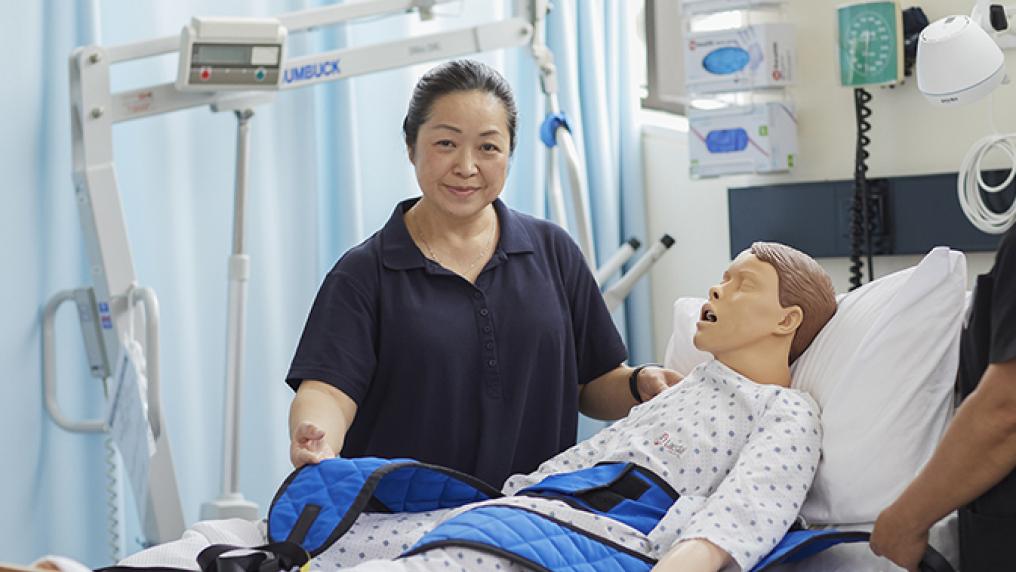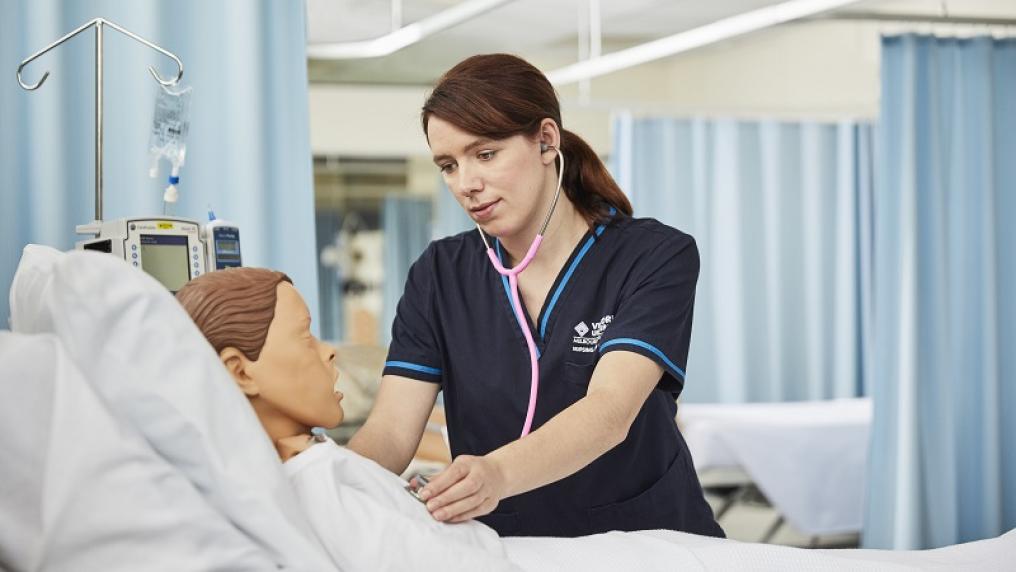The 10 most in-demand jobs in Australia right now
Are you looking to upskill or start a new career where you'll have plenty of opportunities?
The Australian Government has published data on the jobs that will be most in-demand over the next five years, based on shortages, expected growth and the Skills Priority List.
From nurses to software programmers, here are the jobs that will be most urgently needed – and what you could study to get there.
Top 10 in-demand jobs – by overall demand
Construction managers
If you love building and construction and feel you have leadership potential, you’ve got a great opportunity to advance your career as a construction manager.
There’s high demand for skilled managers across residential, commercial and industrial projects.
You’ll plan, direct and oversee all aspects of the building process – from planning and design to development, construction and the day-to-day operation of the job site.
What to study
Studying a Diploma of Building and Construction (Building) CPC50220 is a great way to develop the skills to manage a wide range of building projects.
To further advance your skills, a Bachelor of Construction Management will give you the expertise to play a leading role in large-scale projects.
Civil engineering professionals
Civil engineers help to plan, design, build and maintain the infrastructure our communities need to function – like our roads, bridges, railways and water systems.
This could be a great career path for you if you love maths and science, are good at solving problems and enjoy managing projects.
As a civil engineer, you can run your own practice or work for government authorities, private industry consulting firms, or major construction companies.
What to study
A Bachelor of Engineering (Civil Engineering) will give you the knowledge and skills you need to start working as an engineer.
Early childhood teachers
If you’re good with children, there are lots of career opportunities in early childhood teaching, working in kindergartens and childcare centres.
You’ll be making a real difference in shaping kids’ futures, helping to nurture their educational, social and emotional development through a combination of learning and play.
What to study
To become an early childhood teacher, you will need to complete a bachelor degree like the Bachelor of Early Childhood Education.
However, you can get started through TAFE with a Certificate III in Early Childhood Education and Care CHC30121, which gives you the skills to work in roles like playgroup supervisor or childcare assistant.
Or, if you're ready to study at the postgraduate level, launch your rewarding early childhood career with our one-year Graduate Diploma of Early Childhood Education.
Registered nurses
Nurses play an essential role in healthcare – perfect for people who are caring by nature, love working at a fast pace and are good at juggling tasks and details.
As a registered nurse, you’ll be able to work in a range of diverse areas, from emergency to aged care, mental health, paediatric care, general practice and more.
What to study
To become a registered nurse, you’ll need to complete a Bachelor of Nursing.
You can also get started through TAFE with a Diploma of Nursing HLT54121, which will allow you to start working as an enrolled nurse (providing care under the direction of a registered nurse) while you continue your studies.
ICT business & systems analysts
Are you fascinated by data? As businesses become increasingly driven by information and technology, there’s high demand for experts who can apply data to solve business problems.
With skills across data science and visualisation, machine learning, cloud technology and IT project management, you’ll find solutions, improve systems and processes, and create new opportunities for business success.
What to study
A great place to start is a course like the Bachelor of Business (majoring in Business Analytics) or Bachelor of Data Science, which will give you cutting-edge digital skills to analyse trends for business success.
If you’re upskilling, you might want to look at courses like the Master of Business Analytics.
Software & applications programmers
If you dream in code, you’re in luck. Software and app developers are always in high demand, with plenty of opportunities to use your technical and problem-solving skills in interesting and creative ways.
As a programmer, you can work to develop, test and update web and mobile apps and software programs across a huge range of industries – and earn a great living doing what you love.
What to study
Studying a Bachelor of Information Technology is a great way to develop your skills and experience in programming, software engineering and app development.
Want to start small? A TAFE course like the Certificate III in Information Technology ICT30120 can get you started developing basic web applications, along with other foundational IT skills.
Or, if you're at the postgrad level, the Master of Applied Information Technology will give those with an IT degree even more advanced training.
Electricians
Do you like working with your hands, solving problems and using maths? You might make a good electrician – a job with lots of flexibility and great earning potential.
As an electrician you can run your own business, or find a jobs across a range of domestic, commercial or industrial settings, including the manufacturing, construction and mining industries.
What to study
The Certificate III in Electrotechnology Electrician UEE30820 is an apprenticeship program that gives you the skills and knowledge to become a licensed electrician.
If you want to try it out before you commit, the pre-apprenticeship Certificate II in Electrotechnology Studies (Pre-Vocational) 22682VIC can be a great way to learn the essential skills, get a taste of the job and prepare you for the next step.
Chefs
Turn your passion for great food into a creative, fast-paced career as a chef.
The hospitality industry is full of opportunities for chefs – whether it’s in a fancy restaurant, a tiny laneway bar, a hotel or a catering company.
As well as creating dishes, you could find yourself busy planning menus, sourcing ingredients, managing staff and a range of other duties to keep the kitchen running smoothly.
What to study
You don’t need a formal qualification to become a chef, but it’s common to upskill with a course like the Certificate III in Commercial Cookery SIT30821.
You can also get yourself ready to step into a supervisor or team leader role by studying the Certificate IV in Kitchen Management SIT40521. This course will advance your skills and prepare you for management roles in the kitchen.
Childcare workers
Looking after children can be a fun and rewarding career, with lots of job opportunities across childcare centres, community services, education programs and private homes.
As a childcare worker, you might find yourself supervising children in their day-to-day routines, planning activities, preparing materials for learning or play, providing entertainment, and supporting their social and behavioural development.
What to study
Starting with a Certificate III in Early Childhood Education and Care CHC30121 will help prepare you for entry-level roles like playgroup supervisor or family day care worker.
A Diploma of Early Childhood Education and Care CHC50121 will further develop your skills and can open you up to more childcare career opportunities.
Aged & disabled care workers
If you’re compassionate, flexible and great with people, working in aged or disability support could be a fulfilling career path for you.
There is always a large demand for skilled care and support workers across residential, healthcare and community settings. You’ll be making a genuine difference in people’s lives, supporting their independence and wellbeing.
What to study
Studying a Certificate III in Individual Support CHC33021 will give you the skills to start working in individual care and community services.
To further your skills and knowledge, a Certificate IV in Disability Support CHC43121 or a Certificate IV in Ageing Support CHC43015 can prepare you for more specialised care.
Top 20 largest industries in shortage
Discover the largest employing industries in Australia that are in shortage – and that you might be hot in-demand for.
| Occupation | How many are currently employed? | Average national salary | How can I start my career at VU? |
|---|---|---|---|
| Aged or disability carer | 336,200 | $75,000 | |
| Primary school teacher | 163,400 | $100,000 | |
| Secondary school teacher | 155,850 | $100,000 | |
| Truck driver | 148,400 | $80,000 | We don't have any truck driving specific courses, but if you're handy and practical, have you considered a trade? |
| Chef | 128,500 | $70,000 | |
| Electrician (general) | 128,300 | $100,000 | |
| Childcare worker | 123,800 | $65,000 | |
| Sales and marketing manager | 119,702 | $95,000 | |
| Motor mechanic | 105,700 | $75,000 | We don't have a course that will qualify you for being a mechanic, but our hands-on trades or engineering course are perfect if you love knowing how things work. |
| Carpenter | 104,900 | $83,000 | |
| Solicitor | 94,600 | $100,000 | |
| Fitter (general) | 68,500 | $85,000 | |
| Hairdresser | 63,400 | $65,000 | |
| Construction project manager | 60,200 | $135,000 | |
| Software engineer | 55,200 | $110,000 | |
| General practitioner | 48,700 | $225,000 | Begin your medical career by building the basis at VU, diving into a course in biomedicine. |
| Project builder | 47,800 | $120,000 | |
| Developer programmer | 43,900 | $110,000 | |
| Metal fabricator | 42,600 | $80,000 | |
| Personal care assistant | 42,300 | $73,000 |
Hear from our students

Get job-ready skills at VU
Are you ready to develop new skills and advance your career in a high-growth industry?
At VU, our courses are designed to get you job-ready, with a focus on practical learning, building real-world skills and knowledge, and opportunities for industry connection.



